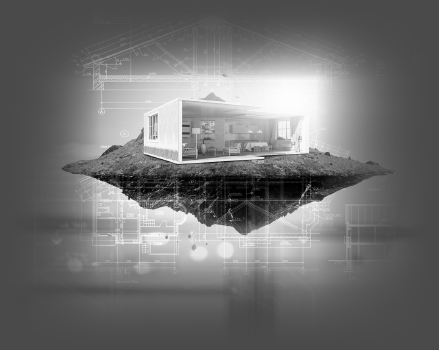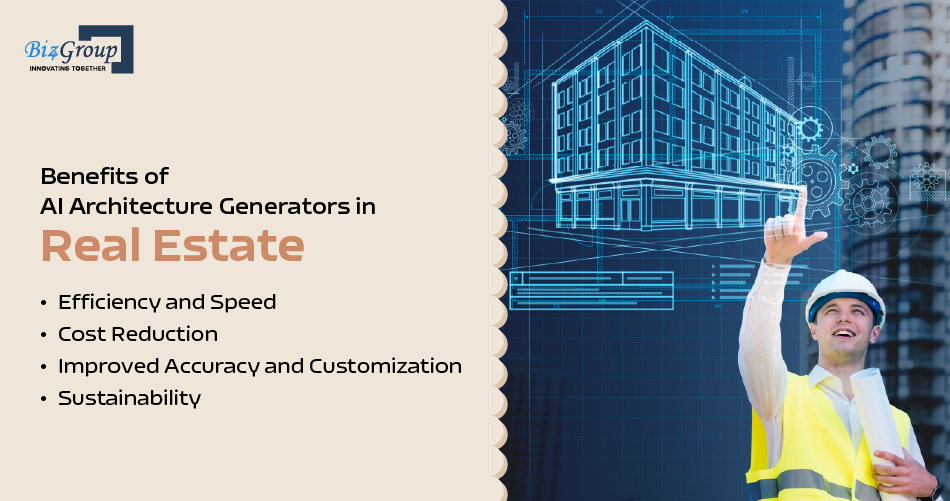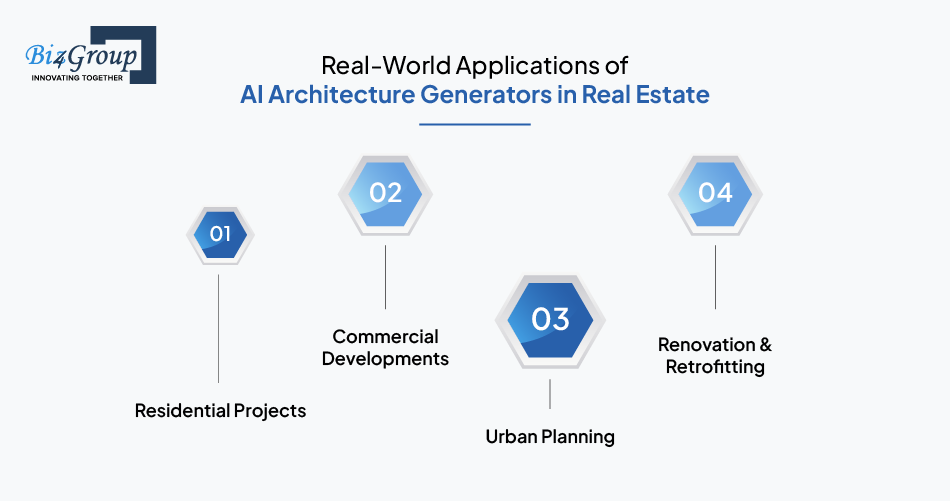Basic AI Chatbot Pricing: A simple chatbot that can answer questions about a product or service might cost around $10,000 to develop.
Read More

AI Architecture Generators are transforming how real estate projects are designed—enabling faster, smarter, and more sustainable development.
These tools streamline the architectural design process by automating layout generation, space planning, and compliance checks, drastically reducing time-to-market.
AI Architecture Generators for real estate support innovation by offering architects and developers a wide range of creative, data-driven design options.
Real-world applications include residential design, commercial space planning, urban development, and renovation—making these tools relevant across the entire property lifecycle.
Despite their advantages, challenges like regulatory compliance, creative limits, and ethical concerns require human oversight and responsible implementation.
Biz4Group helps businesses build and integrate powerful AI architecture generator tools for real estate, offering custom solutions, workflow integration, and ongoing support.
Artificial Intelligence (AI) is revolutionizing industries—and real estate is at the forefront. The global AI in real estate market was valued at USD 2.9 billion in 2024, with projections soaring to USD 41.5 billion by 2033 (CAGR ~30.5%). For generative AI in real estate, the market is also gaining traction—rising from USD 0.59 billion in 2024 to an anticipated USD 0.77 billion in 2025 (CAGR ~30.7%). Furthermore, broader AI applications in real estate are forecast to jump from USD 165 billion in 2023 to USD 227 billion in 2025.
These figures highlight an accelerating shift toward powerful AI Architecture Generators—especially the use of AI Architecture Generator for real estate—reshaping traditional workflows and unlocking new design possibilities.
AI architecture generators are now revolutionizing the architectural process. These powerful AI architecture generator tools for real estate empower architects and developers to:
Let’s begin by defining what AI Architecture Generators are and outlining the benefits they bring to modern real estate.
Moreover, our team at Biz4Group, an expert AI software development company, is fully equipped to manage and complete projects tailored to real estate, delivering solutions powered by these cutting-edge AI architecture generator tools for real estate.
An AI architecture generator is a software tool that employs the use of artificial intelligence, in generating building layouts and designing architectural layout. These tools function through applying sophisticated algorithms, and machine learning to inputs, including environmental conditions, spatial constraints, and design preferences, to produce the best possible architectural yard maps.
In the field of real estate, proponents of AI architecture generators predict that using these tools can help to decrease the time it takes to generate the first set of designs, while at the same time increasing the level of precision. As an architect, it may be possible to use artificial intelligence to automatically generate many design components, rather than having to do it manually or using model systems.
As AI takes on mundane tasks, architects can concentrate on honing difficult design issues and aim for improved usefulness and form.
Our team at Biz4group holds experience in offering various AI consulting services. Consultation for developing AI-based projects in real estate is one such example.

Using AI architecture generators has several advantages that help in redesigning real estate projects and their management.
AI offers architects the chance to generate several design solutions in a short time, which cuts the time for implementing the project. Complex space planning tasks are stated to be managed by 72% of design firms through AI by 2025 as firms continue to adopt such approaches to complete their projects in a shorter duration.
AI has the potential of helping save costs since it acts as an advisor on the best way to use resources, time, and manpower. This contributes to the diminishment of construction costs and minimizes the likelihood of design mistakes.
Moreover, when it comes to delivering AI real estate solutions by our team at Biz4Group, they ensure that the project justifies the cost incurred in it, and thus the team is successful in coming up with happy clients.
The use of AI when it comes to generating designs is not only efficient, but they are also accurate. It is possible to switch between the options with the respective tools allowing real estate developers, and architects to offer their clients what they need without compromising the project.
Leverage AI Architecture Generators to cut costs, speed up design, and boost sustainability in your next development.
Schedule a Free AI ConsultationAI assists in specifying sustainable features such as energy use, material recycling and green construction practices right into the design. Because sustainability is a crucial requirement for real estate at present, the practical and efficient building design made possible by AI is a significant benefit.
Moreover, our team at Biz4Group are experienced enough to come up with developing exceptional mobile apps for real estate agents.

The integration of AI Architecture Generators into real estate is no longer a futuristic concept—it’s already reshaping how projects are conceived, designed, and executed. These tools are being used to automate complex tasks, optimize resources, and unlock creativity in ways that traditional workflows could not. From single-family homes to smart urban hubs, powerful AI architecture generator tools for real estate are being applied at every scale.
By leveraging machine learning, generative design, and real-time data inputs, these tools enable architects, planners, and developers to create functional, sustainable, and customized environments with remarkable speed and accuracy.
Let’s take a closer look at how AI architecture generators are transforming different sectors within real estate:
Let's now delve into the details of how AI architecture generators impact real estate sector on all positive grounds. Meanwhile, reading this blog if you have prepared your mind to share your real estate AI app ideas with our team of experts, you’re at the right place:
AI tools support the works of architects, and do not take their place. Since most of these tasks are repetitive, automation allows architects to spend more time on thinking and coming up with unique solutions.
The use of AI will largely be integrated into the design process, leading to architects transitioning to the position of supervising AI to improve their work.
AI architecture generators significantly accelerate the construction timeline by automating the design phase, allowing developers to bypass traditional bottlenecks. This means real estate projects can move from concept to market faster, improving time-to-delivery and competitive advantage.
Moreover, these tools offer architects multiple innovative design alternatives—some of which may never have been conceived manually. This sparks creativity, promotes design diversity, and unlocks new architectural possibilities.
Reflecting this trend, the generative AI market in construction is projected to grow from $142 million in 2023 to $2,855.1 million by 2030, highlighting the surging demand for faster, AI-powered construction solutions.
AI is not only used to enhance design facilitation. It also helps in forecasting property price trends, strength, and architectural transformation of properties based on history. It becomes easier for developers to make a wise decision, by identifying areas that can be explored, and the type of project that can provide maximum profit.
Get tailored AI-powered design solutions that align with your workflows and project goals.
Start Your Custom AI ProjectHere are some top tools selection as AI Architecture Generator. Moreover, when it comes to AI tools in real estate, there comes a general requirement for chatbot development for real estate.

Midjourney is a concept design AI tool that enables architects to design, and generate photorealistic images based on written descriptions. More often than not, it is especially helpful during the project conceptualization stage where architects can easily have an overview of the complicated designs they wish to draw.

Maket.ai pre-designs architectural design by coming up with thousands of architectural designs, which can be selected in relation to the clients' needs and the physical space available. It has an enhanced algorithm that enables real time working and reduces by great extent the time taken to develop the plan. You can enquire more about the tool through its AI chatbots in real estate.

This platform focuses on developing the accurate, and efficient schematic design according to the project needs. Arkdesign.ai has features such as automated cost estimates, and intelligent rendering of 3D models to assist architects in making efficient design choices.

ARCHITEChTURES is an AI-generated web-based software that helps in designing residential buildings. It enables users to create unique designs within a short period, taking into account the building codes, zoning laws, and other site characteristics. It also offers real-time feedback when rules are breached, as well as assistance in choosing materials.

Fotor’s Artificial Intelligence architectural structure allows for creation of complex architectural designs from written input. It can create simple 2D text output and also 3D graphical models which can be detailed with textures and lights. Fotor also has features for interior designs; it has the AI interior design option where the user can select layouts.
Join leading developers and architects embracing AI to stay competitive and future-ready.
Talk to Our Experts TodayWhile AI Architecture Generators offer remarkable advantages in real estate design and development, they also come with certain limitations and risks that need thoughtful consideration. As these tools become more widely adopted, the industry must address a number of technical, ethical, and practical challenges to ensure responsible integration.
Let’s explore the key challenges currently shaping the debate around AI-driven architecture:
AI tools generate designs based on pre-trained data, which may limit originality. While they can propose countless variations, they often remix existing styles rather than create something truly novel.
Solution: Encourage hybrid design workflows where AI suggests options, but architects apply critical thinking, creativity, and contextual knowledge to enhance and humanize the design. This ensures a balance between efficiency and originality.
Many AI architecture generators lack native awareness of region-specific building codes and zoning regulations, which can result in non-compliant designs requiring time-consuming revisions.
Solution: Invest in localized compliance integration within AI tools. Embedding regulatory datasets into AI models can help generate designs that meet local laws from the outset, reducing legal risk and rework.
AI cannot fully replace the nuanced judgment, empathy, and adaptability of human professionals. Sole reliance on AI risks overlooking human-centric and site-specific needs.
Solution: Maintain strong human oversight in all AI-driven projects. Architects and planners should validate AI-generated options, ensuring that designs align with cultural values, environmental context, and stakeholder objectives.
AI systems trained on limited or skewed data may produce uniform, Western-centric designs—neglecting local traditions or unintentionally reinforcing cultural and socioeconomic bias.
Solution: Use diverse and inclusive training datasets to reflect a broader spectrum of architectural styles and cultural contexts. Additionally, implement ethical oversight and transparency in the development and deployment of AI tools to avoid systemic bias and ensure inclusivity.
By recognizing these challenges and proactively addressing them, developers and architects can use AI architecture generators in real estate not only as productivity enhancers—but as ethical, inclusive, and creative collaborators.
Indeed, the future of real estate development appears to be on the precipice of radical change with the further adoption of AI architecture generators. As these tools advance, they will not only impact the design of individual buildings, but also the overall urban design and management of properties. When it comes to management of properties, there are dedicated AI property management software, developed by our team at Biz4Group.
Currently, 72% of design firms and 68% of interior design firms are likely to integrate AI into their operations by 2025. This shows that the real estate industry is quickly adopting AI. This extensive implementation is a shift in the industry that will see AI integral in the project planning and delivery, costs, and creativity.
Therefore, real estate firms that embrace AI early will be advantaged and be in a position to deliver the projects within a shorter time and better designs. In the future, like CAD tools for the current technological era, the application of AI will be considered as a norm for architects and developers.
This means that with AI architecture generators, it becomes possible to design not only specific buildings but complete neighborhoods. Through AI, big data that include factors such as population growth, environmental issues, transport, and other aspects of cities can be evaluated comprehensively.
This helps real estate developers, as well as city planners to design more efficient cities that help overcome the complexities of urbanization. For instance, AI tools can suggest the best positioning of buildings so that they can use energy efficiently, or decide on the patterns of traffic flow and other elements, such as green zones that will create a more comfortable living environment for people.
In the future, AI will be employed to engage in the construction of smart cities taking into consideration sophisticated requirements that go hand in hand with the current generation cities.
Apart from the design phase, AI is expected to play a pivotal role in the management and maintenance of the real estate properties. AI architecture generators are one of the subsets of AI frameworks for construction and building design, that also encompass AI predictors and building control systems.
In the commercial and residential real estate, this will imply that AI will be able to forecast for maintenance requirement before it becomes due, thereby saving long-term costs of repairs while keeping building functional.
It is a system that may involve checking the condition of the buildings’ structure, controlling energy consumption, and managing other processes such as heating, ventilation, or lighting using intelligent control systems. Integrating artificial intelligence with smart building technology will aid developers in coming up with quality, sustainable, efficient, and friendly real estate projects.
With the advancement in AI architecture generators, the use of these in real estate appraisals and investment decisions will also rise. In this respect, AI concludes the design of accommodation, using architectural designs of properties to estimate the future value of properties, therefore making developers have a better estimate of return on investments.
Also, AI can determine the likelihood of the enhancement of property value relative to various design factors like using environmentally friendly construction materials or integrating the spaces with smart technologies. Real estate agents and brokers will be able to make evidence-based predictions of what the market will require in the future.
However, the rising implementation of AI in architecture and real estate development has some issues as well. Pertaining to jobs, AI solutions present multiple ethical dilemmas, including job losses, privacy, and environmental concerns that must be guarded against.
The construction industry may also have challenges with traditional architects and builders who may be reluctant to embrace AI. Nevertheless, these issues are likely to be addressed over time by means of enacting legislation to regulate AI use, with the aim of achieving a proper blend with professional practice.
At Biz4Group, we specialize in building cutting-edge AI solutions tailored for the real estate and construction sectors—empowering businesses to harness the full potential of AI architecture generators.
Whether you’re a real estate developer, construction firm, or architectural studio, our team can help you:
We build bespoke AI tools that automate architectural design processes based on your specific needs. From site planning to 3D layout generation, we develop intelligent systems that speed up design cycles while improving precision and efficiency.
Already using software like AutoCAD, Revit, or BIM tools? We seamlessly integrate AI-powered modules into your existing tech stack to improve productivity without disrupting your current processes.
Our AI solutions can automatically generate optimized space plans based on data like sunlight, airflow, zoning laws, and usage intent—ideal for residential, commercial, and urban planning projects. We also offer interactive 3D visualizations and VR-ready layouts for client presentations or internal review.
We implement AI models that take local building codes and zoning regulations into account. This ensures all design outputs are not only creative but also compliant, reducing legal risks and revision costs.
From AI strategy consulting to full-scale software development, our experts work alongside your team to turn innovative ideas into scalable products. We also offer ongoing maintenance and AI model training tailored to real estate applications.
Partner with Biz4Group to design, develop, and deploy AI architecture tools that deliver real results in real estate.
Get Your Custom AI SolutionAI architecture generators are transforming real estate—and Biz4Group is here to guide your business through that transformation. Whether you're starting from scratch or enhancing existing systems, we help you move faster, build smarter, and stay competitive in a rapidly evolving market.
Ready to explore what AI can do for your real estate business?
Contact us today for a free consultation or product demo.
An AI Architecture Generator is a software tool that uses artificial intelligence to automate the design of building layouts, floor plans, and site planning. It helps speed up the design process, reduce costs, and generate optimized, data-driven designs—making your projects more efficient and market-ready.
Yes, with proper implementation. Biz4Group customizes AI tools to incorporate local compliance rules, helping you avoid costly revisions. We also include human oversight to ensure that all outputs meet regional regulations and standards.
Not at all. AI enhances human creativity—it doesn’t replace it. Our solutions support architects by automating repetitive tasks and providing data-driven design options, so professionals can focus on higher-level decisions and innovation.
Absolutely. Biz4Group specializes in integrating AI solutions into existing real estate and architecture software environments, ensuring smooth adoption without disrupting your current workflows.
Project timelines vary based on scope, but most MVPs (Minimum Viable Products) can be built in 8–12 weeks. We follow an agile development model, keeping you involved at every step and ensuring fast, scalable delivery.
AI is extremely effective for both. For renovations, we use 3D scanning and AI-powered layout optimization to suggest smart, efficient redesigns without needing to start from scratch.
with Biz4Group today!
Our website require some cookies to function properly. Read our privacy policy to know more.